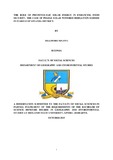Please use this identifier to cite or link to this item:
https://cris.library.msu.ac.zw//handle/11408/2161Full metadata record
| DC Field | Value | Language |
|---|---|---|
| dc.contributor.author | Ndlovu, Tellmore | - |
| dc.date.accessioned | 2017-06-23T07:36:13Z | - |
| dc.date.available | 2017-06-23T07:36:13Z | - |
| dc.date.issued | 2015-10 | - |
| dc.identifier.uri | http://hdl.handle.net/11408/2161 | - |
| dc.description.abstract | Access to reliable and affordable energy is a key lever to enhance sustainable livelihoods and an important prerequisite for agrarian economies in Sub Saharan Africa to address food security challenges faced in the region. Limited and unreliable energy supply mainly from conventional energy sources has been a major impediment to increase agricultural productivity in most irrigation schemes in Zimbabwe. Despite having the best solar radiation levels, little research has been conducted to evaluate the contribution of solar PV energy as an alternative to improve agricultural productivity and food security in Zimbabwe. The study examined the role of solar PV energy in enhancing food security focusing on Pelele solar powered irrigation scheme in ward 12 of Gwanda district. The research provided a broad assessment on the role of solar PV energy in food security at Pelele village to bridge the existing knowledge gap using a case study research design. Data was acquired through the use of questionnaires, interviews, focused group discussions, observations and secondary sources of data. The results of the study revealed that the ample availability of free energy from the sun throughout the year significantly stimulated positive impacts on food security. The impacts included increased food production, cost savings, multiple crops in a year, improved food stability and reduced carbon foot print. The research found that solar PV pumping enhances water availability, consistency and sufficiency to meet crop water requirements which allow for sufficient quantities of food to be produced on a consistent basis. Sustained food production allows farmers to stretch their food stocks for long to eliminate recurrent shocks of drought and seasonal food shortages experienced in the district. The results of the study also established great reliability of solar PV owing to availability and consistent power supply that meets energy demand throughout the year coupled with high durability of solar PV pump. The study further established that the annual total power produced by solar panels at Pelele irrigation was 3520kWh/year which far exceeds annual demand of 1170kWh/year. This showed that the solar PV system is oversized. However the study revealed that the underutilized energy presents a huge potential for energy sharing to power other food security activities such as poultry lighting and refrigeration to reduce post-harvest losses of perishables such as tomatoes. The research concluded that solar PV significantly enhance food security. The study recommends that the ministry of Agriculture, Mechanisation and Irrigation development should partner with NGOs to replace diesel engine pumps with solar PV system on abandoned irrigation schemes in Gwanda district to enhance food security. | en_US |
| dc.language.iso | en | en_US |
| dc.publisher | Midlands State University | en_US |
| dc.subject | Photovoltaic solar energy ,food security. | en_US |
| dc.title | The role of Photovoltaic solar energy in enhancing food security. A case of Pelele solar powered irrigation scheme in ward 12 of Gwanda District. | en_US |
| item.languageiso639-1 | en | - |
| item.fulltext | With Fulltext | - |
| item.grantfulltext | open | - |
| Appears in Collections: | Bsc Geography And Environmental Studies Honours Degree | |
Files in This Item:
| File | Description | Size | Format | |
|---|---|---|---|---|
| Ndlovu - dissertation.pdf | Full text | 1.35 MB | Adobe PDF |  View/Open |
Page view(s)
226
checked on Jan 29, 2026
Download(s)
174
checked on Jan 29, 2026
Google ScholarTM
Check
Items in MSUIR are protected by copyright, with all rights reserved, unless otherwise indicated.



